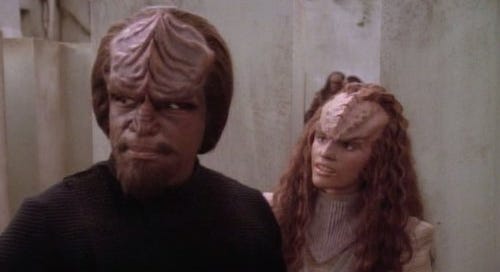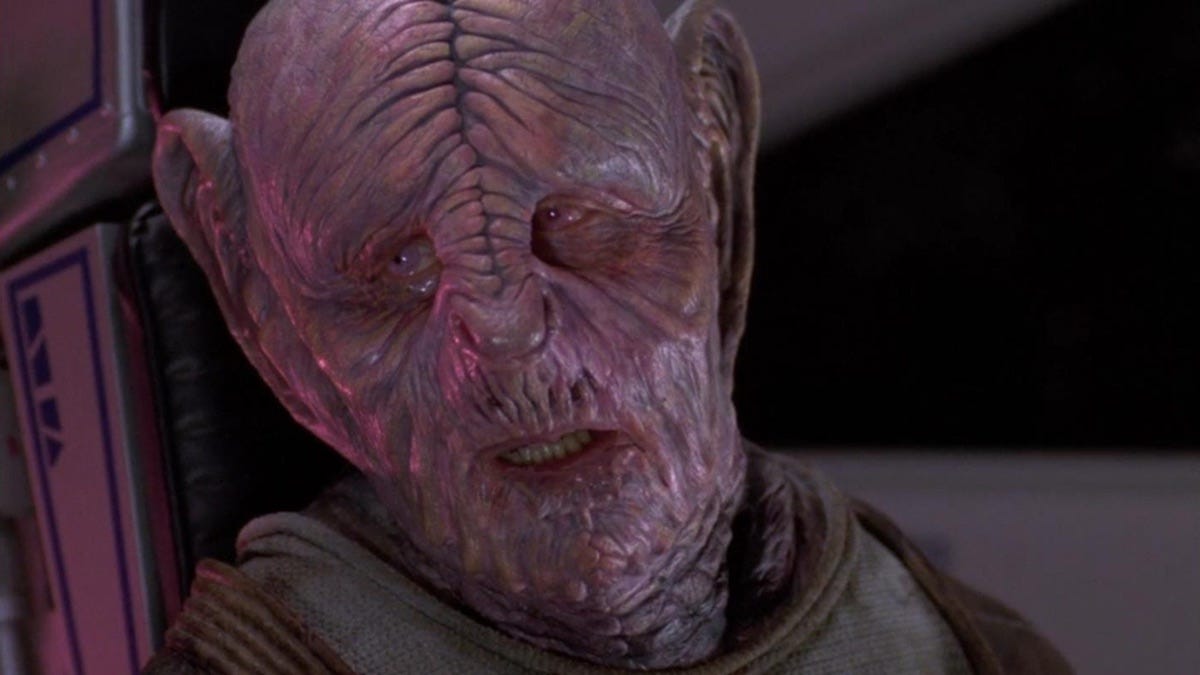My ongoing Star Trek rewatch has reached what I remember as something of a groaner from last time through: “Birthright,” which must count as one of the most awkwardly paced two-parters in television history. The writers had three concepts they somehow wanted to juggle—a DS9 crossover (featuring the familiar Promenade set as well as Dr. Bashir and no one else), new revelations on Data’s background and capabilities (he discovers that his creator, Dr. Soong, gave him the ability to dream), and Worf’s ongoing grappling with his father’s legacy. The latter two are obvious A-plot/B-plot bait, but the writers bizarrely chose to confine the parallel to the first episode only, devoting the entire second episode to the Worf plot alone.
The individual plot threads themselves are also both very strange on their own terms. Data’s plot begins with him meeting Bashir, who is trying to figure out a doohickey from the distant Gamma Quadrant. In the course of testing, Data gets blasted with it—which unexpectedly sets off a dream sequence where he sees a younger version of Dr. Soong hammering at an anvil. After doing dozens of paintings [sic] as a way of processing his experience, Data decides to get blasted again on purpose, and dream Soong reveals that Data has unlocked his dreaming ability. Nowhere is it clarified why he pegged this to getting blasted by a particular energy beam that apparently is only found in a remote part of the galaxy that had never been visited by humans prior to a couple years ago.
Worf’s engagement with his father is prompted by an encounter with a Random Alien Dude (played by James Cromwell, better known to Trek fans as Zefrem Cochrane) who claims that Worf’s father, Mogh, was not killed in the world-historically important battle at Khitomer but is still alive in a Romulan prison camp. Since this would mean his father was dishonored, Worf is extremely grumpy for a while, then decides to go with Random Alien Dude to the camp. Turns out that Mogh really has been dead the whole time, but there are several Klingons in the camp who have—shamefully, unthinkably—adopted a peaceful agrarian lifestyle. Reportedly they were captured by the Romulans while unconscious and thus could not secure an honorable death in battle. To avoid shame to their families, they have stayed in a camp administered by a merciful Romulan, who even married a Klingon and had a child by her. Worf is Extremely Upset that all this is going on and sets about teaching them authentic Klingon ways, until the administrator decides he’s too much of a pain in the ass and he has to be executed. Only an “I am Spartacus” routine saves him—leading the Romulans to drop off Worf and a few of the young people, with a cover story that will keep the existence of the camp and therefore the surviving Klingons’ dishonor a secret. (Meanwhile, the Enterprise has been trying and failing to track Worf down, which is all rendered irrelevant when the Romulans drop him off.)
And Random Alien Dude’s motives are never revealed! That plot just tapers off into nothing! In short, not a masterpiece. I stand by my initial assessment that it was a groaner, and not just because “Klingon Culture” episodes are always groaners to me.
But I think they thought they were trying something. My clue here is a series of weird parallels with The Odyssey. The first is the whole premise of the Worf plot, which begins by introducing ambiguity over whether his father is actually dead or is simply lost after a long-ago war. This sets Worf up to be Telemachus, who processes some Big Emotions (resulting in intemperate words to his mother, similar to Worf biting Riker’s head off about a simple request) about his famously absent father. When Worf arrives at the camp, however, he has instead become Odysseus, because he encounters a young woman bathing, who turns out to be the daughter of the camp’s Romulan administrator and his Klingon wife. The parallel with Nausicaa could not be clearer, and it continues as they tease the possibility of a romantic connection between them (ruined when Worf pulls back her hair to find pointy Romulan ears and finds that he just cannot).
Most striking, though, is a kind of reenactment of the famous scene where Odysseus strings his bow and shoots through the axes. In this case, he discovers that the children of the disgraced prisoners of war are using Klingon weapons as farm implements and toys, and he shows them how it’s really done by throwing a spear through a rolling hoop—a feat that the leading brash young man (belligerent against Worf but obviously longing to be won over) cannot replicate. Here, though, instead of massacring everyone as Odysseus does, Worf sets about teaching them Klingon legends and martial disciplines, which so threatens to disturb the hard-won harmony of the camp that the administrator decides to put Worf to death. (Releasing him is not an option because it would shame the prisoners and their families if the existence of the camp was ever revealed, and they don’t trust Worf to keep a secret.) But by that point, the young people are so pro-Worf that they line up to be executed as well, leading to the aforementioned conclusion to the story.
Like The Odyssey, this is the story of the younger generation that has gone to seed. Odysseus’s generation is made up of one hero after another, while Telemachus and the suitors are a bunch of wimpy entitled losers who don’t know how good they have it. In one of the most cathartic scenes in world literature, Odysseus of course cleans house by slaughtering the whiny frat boys who were trying to get with his wife. The implication is that they were permanently, unfixably spoiled—there is no way that Odysseus can coexist with such decadent individuals. In “Birthright,” by contrast, the younger generation has in a sense been victimized, deprived of the warrior culture that is their, well, birthright. Almost the instant Worf begins teaching them the warlike ways of real Klingons, they are sucked in—and in the decisive moment, they show remarkable courage, declaring they are willing to die a warrior’s death.
I have so many questions about this episode! I have often said that Star Trek is a cosmopolitan utopia where racism turns out to be true (for the alien species), and nowhere is that more in evidence than in this episode. The clear implication is that Klingons and Romulans can only live in peace in a completely controlled environment where they have been deprived of the basic truths about their culture (indeed, the younger generation doesn’t even know the real origin of the camp). As soon as the young Klingons learn about warrior ways, they instantly respond with exhiliration. So Klingons really are hard-wired for violence? Also, Worf is incredibly racist against the Romulan-Klingon mixed race woman to whom he was initially attracted—and to make matters worse, his discovery of her ears in mid-embrace makes the scene feel like a “gay panic” or “trans panic” situation. Worf incompetently apologizes—saying that it is “not her fault” that she is presumably an abomination—and she is ultimately among the group of young people who stake their lives to save Worf. Yet she confirms his diagnosis of her situation by staying behind in the camp, believing she could never be accepted in either Romulan or Klingon culture—apparently the only two options, even though Worf grew up among humans and presumably turned out fine.
Returning to the Odyssey parallel, I will say that Worf’s transition from Telemachus to Odysseus does make sense in terms of the original, because Telemachus “graduates” by the end, becoming the only member of his generation to join in the slaughter of his coevals. Similarly, we repeatedly see that Worf is virtually the only present-day Klingon who takes the warrior ideals seriously in a non-hypocritical way, making him a throwback to the “heroic” generation represented by his father (whose family legacy Worf’s coevals repeatedly attempt to besmirch, much as the suitors try to violate Odysseus’s marriage bed).
But what doesn’t make sense is the idea that the Klingon warrior ideals… are good! Why should it be shameful for Klingons to live at peace with Romulans? Why should we be upset to see Klingon weapons literally beaten into plowshares? Why should war and death, however “honorable,” be the presumptive birthright of everyone who has the misfortune to be born Klingon? Isn’t the warrior ethos most often treated as a kind of cosplay that the Federation indulges as a transitional phase to the Klingons’ eventual pacification? And again, wouldn’t that be—good? Are we supposed to be disappointed that there is going to be less fighting and death in the future, simply because fighting and death is supposed to be in the Klingons’ blood?
This is what Star Trek can never quite figure out, and it’s why the franchise’s fascination with Klingons has never really sat right with me. The decision to make the Klingons allies rather than rivals was a true conceptual breakthrough for the franchise, a visionary moment of optimism—and it’s as though they’ve spent the decades since walking it back as much as humanly possible, until Discovery closed the circle by giving us undeniably monstrous Klingons who completely kick the Federation’s ass. And to all that, I counter simply that war is bad and a culture that worships war is bad. We should want Klingons to stop being culturally Klingon in the sense to which they are accustomed. That is a redemptive arc. That would be the ultimate instantiation of the Star Trek ideal. But somehow the siren song of an honorable death proves irresistible, again and again.






Worf is interesting because he has that classic second-generation immigrant attraction to the lost purity of the home culture he's never really known--something that I don't think the showrunners ever fully and consciously recognized about the character (and thus never really let him grow beyond it/become fully self-reflective about it).
I'm not sure why, but Cromwell's alien sort of looks to me like what you'd get if you combined a Xenomorph and Winnie the Pooh.
An uncomfortable angle is that Worf is usually in the wrong when interacting with other Starfleet officers --- he's pushed to operate in ways that are less aligned with "warrior values" --- while when dealing with other Klingons his dedication to those values is narratively framed as good. Doyleanly, they want it both ways: the thrill of a warrior culture "over there," keeping the purity of Starfleet civilization "over here," with Worf as the hinge --- Klingon culture is implicitly inferior to the Federation's, so he has to be taught, but as he's the Federation's Klingon he also has to be the most Klingon Klingon.
There are analogies there with Data's superb capabilities being highlighted/useful/important when dealing with opponents or natural obstacles, but who explicitly recognizes (and is seldom offered a supportive counter-argument) them as insufficient and perhaps negatives to his value wrt other Starfleet officers.
Echoes there, maybe, of the Colonialist trope of the savage sidekick who's superior to his peers in "savage skills" but still inherently inferior to the protagonist in part because of those same skills/attitudes?
I pondered for a bit if the same cannot be said of Spock --- he out-Vulcans the Vulcans when he has to, while the nominal cultural ideal in Starfleet remains non-Vulcan. But he's much more self-confident than Worf or Data, and Kirk treats him as a fully realized peer in a way Picard doesn't treat Data or anybody treats poor Worf.